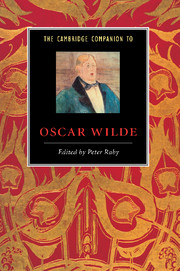Book contents
- Frontmatter
- Part I Context
- Part II Wilde's works
- 4 Wilde as poet
- 5 Wilde the journalist
- 6 Wilde as critic and theorist
- 7 Wilde's fiction(s)
- 8 Distance, death and desire in Salome
- 9 Wilde's comedies of Society
- 10 The Importance of Being Earnest
- Part III Themes and influences
- Select bibliography
- General index
- Index of works by Oscar Wilde
8 - Distance, death and desire in Salome
from Part II - Wilde's works
Published online by Cambridge University Press: 28 May 2006
- Frontmatter
- Part I Context
- Part II Wilde's works
- 4 Wilde as poet
- 5 Wilde the journalist
- 6 Wilde as critic and theorist
- 7 Wilde's fiction(s)
- 8 Distance, death and desire in Salome
- 9 Wilde's comedies of Society
- 10 The Importance of Being Earnest
- Part III Themes and influences
- Select bibliography
- General index
- Index of works by Oscar Wilde
Summary
'I have one instrument that I know I can command, and that is the English language', Wilde said in an interview published in 1892. 'There was another instrument to which I had listened all my life', he explained, 'and I wanted once to touch this new instrument to see whether I could make any beautiful thing out of it.'
The beautiful thing he had made was a one-act play, Salome, written in French in Paris in late 1891 and offered to Sarah Bernhardt for a London production, in French, in 1892. 'Sarah va jouer Salome, Wilde wrote excitedly to the novelist Pierre Louys, perhaps in June of that year (L 316). By late June, the celebrated French actress was in rehearsal at the Palace Theatre, London, when the Lord Chamberlain's Examiner of Plays, E. F. S. Pigott, denied a licence for performance on the grounds of a prohibition against biblical characters on the stage. William Archer, champion of Ibsen and other avant-garde dramatists, condemned the Examiner's decision in bitter terms: 'A serious work of art, accepted, studied, and rehearsed by the greatest actress of our time, is peremptorily suppressed.' On reflection, what is puzzling is not the denial of a licence but the blithe assumption (attributed by Wilde's friend and literary executor Robert Ross to Bernhardt's ignorance of English stage censorship) that a licence would be forthcoming. For beneath Pigott's official reliance on Henry VIII's interdiction of mystery plays lay a condescending disdain for serious poetic drama and, some might have added, a covert preoccupation with sexuality that he shared with the public he served. Describing England's 'loathsome pruriency' in their 1913 study of English censorship, Frank Fowell and Frank Palmer observed that sex had been degraded 'into a national obscenity, a thing of dark places, of shame and disease'.
- Type
- Chapter
- Information
- The Cambridge Companion to Oscar Wilde , pp. 118 - 142Publisher: Cambridge University PressPrint publication year: 1997
- 2
- Cited by



